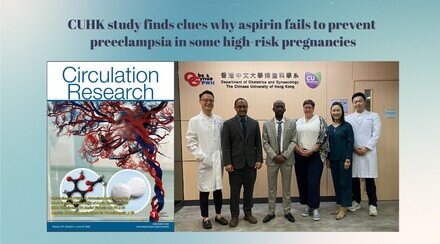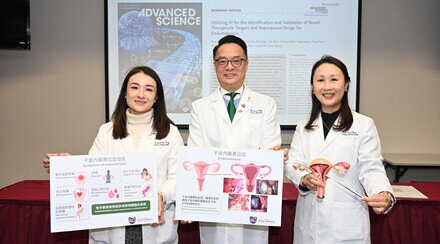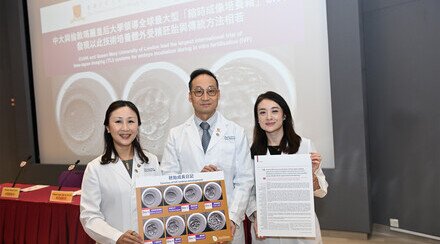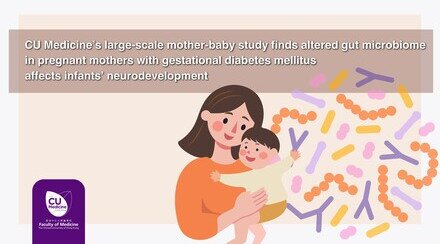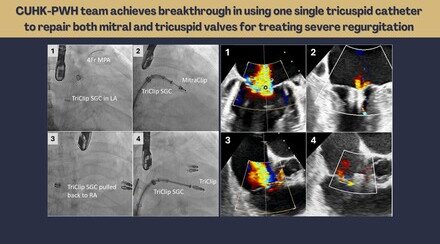CUHK leads multi-centre Asian study showing that an early screen-and-prevent strategy for preterm preeclampsia is effective at lowering risk of complications for high-risk women by 41% Pilot service at Prince of Wales Hospital showed promising outcome
The Department of Obstetrics and Gynaecology at The Chinese University of Hong Kong (CUHK)’s Faculty of Medicine (CU Medicine) led counterparts from 10 regions of Asia, including Hong Kong, as they conducted a study assessing the efficacy, acceptance and safety of an early screen-and-prevent strategy for preterm preeclampsia. The research team screened over 42,000 pregnant women and provided low-dose aspirin to high-risk women as an early intervention. Results showed that the strategy helped lower the risk of preterm and early onset preeclampsia, as well as spontaneous preterm birth and perinatal death, and was widely accepted by pregnant Asian women. The findings have been published in the international medical journal Circulation. The CU Medicine team has collaborated with the Department of Obstetrics and Gynaecology at the Prince of Wales Hospital (PWH) to provide screening and prevention services for preeclampsia at PWH since 2022, with promising results.
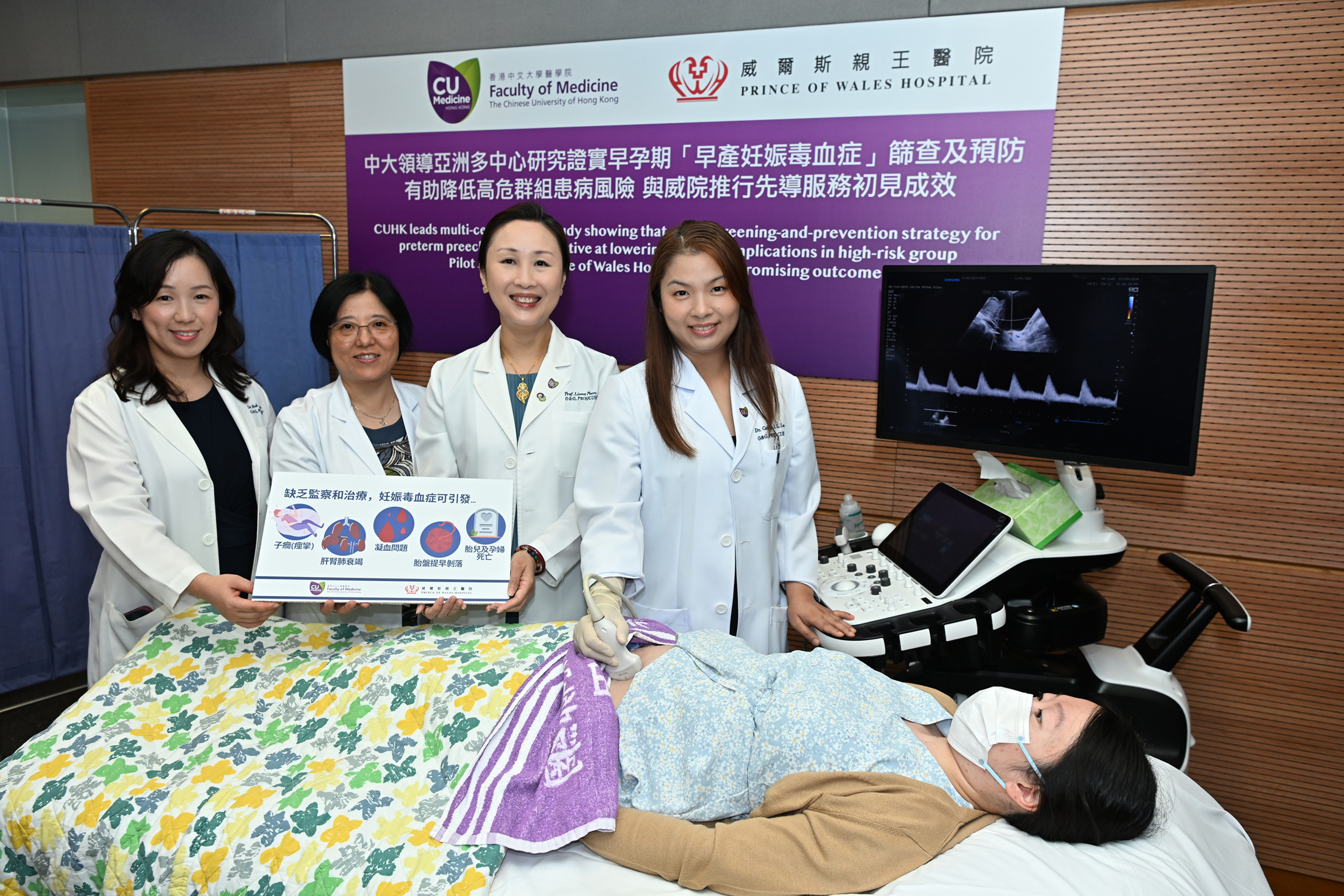
A CU Medicine-led multi-centre Asian study proved early screen-and-prevent strategy for preeclampsia helped lower the risk of preterm and early onset preeclampsia, as well as spontaneous preterm birth and perinatal death. The CU Medicine team collaborated with the Department of Obstetrics and Gynaecology at the Prince of Wales Hospital (PWH) to provide screening and prevention services for preeclampsia at PWH since 2022, with promising results.
(From left) Dr Isabella Wah Yi-man and Dr Symphorosa Chan Shing-chee, Consultant and Chief of Service, Department of Obstetrics and Gynaecology, Prince of Wales Hospital; Professor Liona Poon Chiu-yee and Dr Caitlyn Lau So-ling, Department Chairperson and Assistant Professor, Department of Obstetrics and Gynaecology, CU Medicine.
Preeclampsia can lead to serious, even fatal complications for both mother and baby
Preeclampsia is an uncommon but serious condition that can lead to many maternal and perinatal complications. The condition typically begins during mid- to late pregnancy or the postpartum period. It affects approximately 2-8% of pregnant women worldwide, resulting in 76,000 women and 500,000 babies dying each year from the disorder during pregnancy, which makes it one of the leading causes of maternal and perinatal morbidity and mortality globally. The condition is traditionally diagnosed based on high blood pressure and the presence of protein in urine after the 20th week of gestation.
Professor Liona Poon Chiu-yee, Chairperson of the Department of Obstetrics and Gynaecology at CU Medicine, explained, “Preeclampsia may not show any symptoms. The condition can get worse with time and symptoms may only go away after delivery. Some affected women develop very severe disease, associated with kidney, liver and neurological problems, while the fetus may experience impaired growth or premature birth, and it can even be fatal for both the mother and the baby. Therefore, early detection is important. Research evidence has shown that low-dose aspirin is an effective intervention for pregnant women at high risk of developing preterm preeclampsia. Jurisdictions in Europe practise a screen-and-prevent strategy for preterm preeclampsia, and we hope that one can be implemented in Asia. We launched this study to investigate the efficacy, acceptance and safety of such a strategy among pregnant women from different regions and cultural backgrounds.”
Low-dose aspirin lowers risk of preterm preeclampsia for high-risk group by 41%
CU Medicine collaborated with counterparts from nine regions in Asia (mainland China, Taiwan, Japan, Thailand, Vietnam, Indonesia, Singapore, Malaysia and the Philippines) in this multi-centre study. It involved screening 42,897 women in early pregnancy (11-13 weeks) between August 2019 and February 2022 using the FMF triple test (see appendix for details) to predict preterm preeclampsia. The high-risk group received an intervention of low-dose aspirin from before 16 weeks until 36 weeks.
Results showed that 88% of participating Asian women accepted this screening strategy. The study proved that low-dose aspirin reduced the risks of preterm preeclampsia and early onset preeclampsia by 41% and 54% respectively. Additionally, the risks of spontaneous preterm birth and perinatal death decreased by 55% and 66%.
Professor Poon remarked, “Though the idea and the tool of a screen-and-prevent strategy for preterm preeclampsia were developed in the West, this study has shown that the strategy is highly accepted by a diverse group of women across Asia from various ethnic backgrounds, indicating that preterm preeclampsia is a major concern for them. The study findings will help promote the global adoption of the screen-and-prevent strategy for preterm preeclampsia as part of early pregnancy prenatal care.”
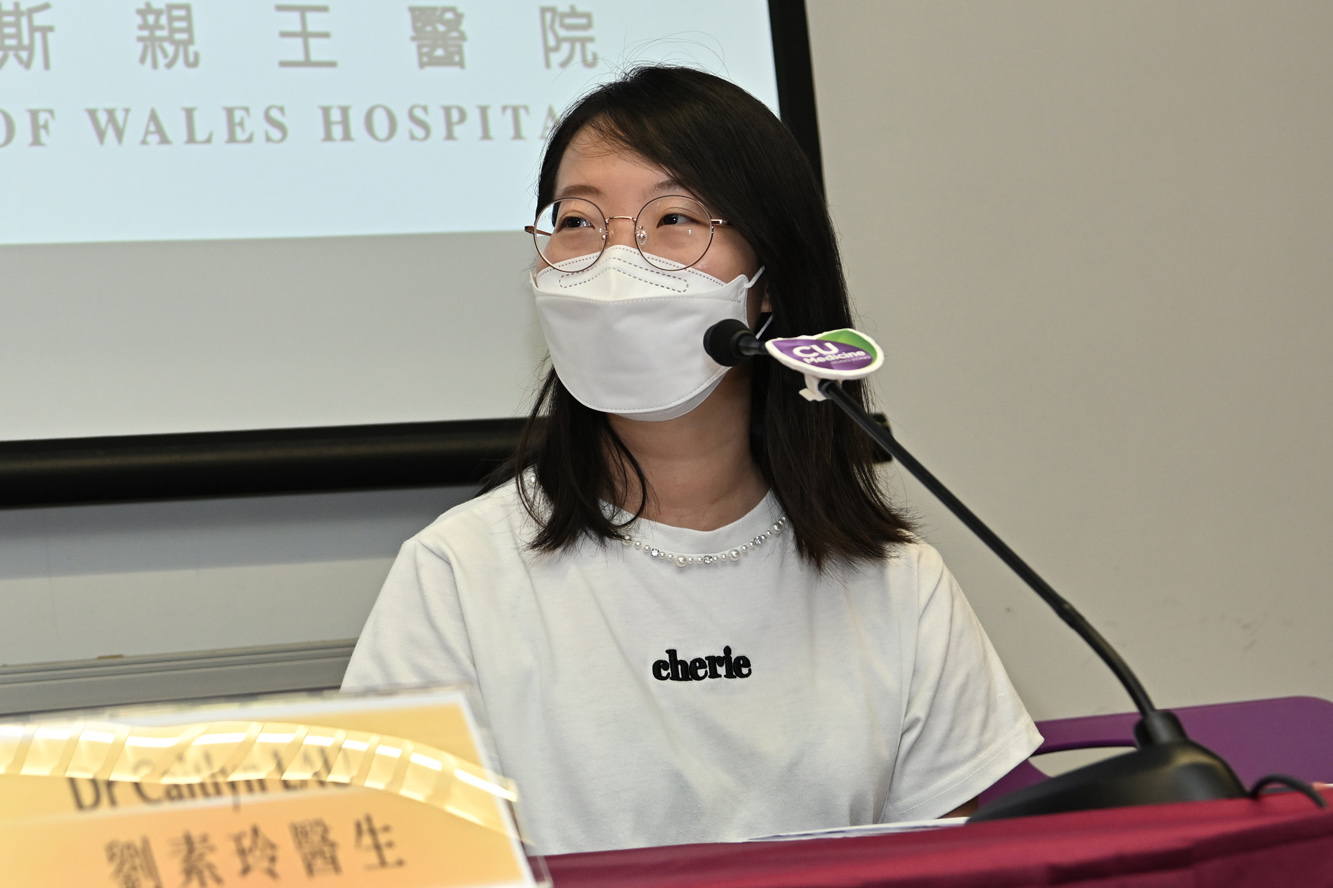
Ms Choy has two daughters. She was found to be at high risk of preeclampsia after screening and had to take aspirin as preventive measure during her first pregnancy. Though she eventually developed preeclampsia, she managed to deliver at 37 weeks. When she was having the second baby, she followed doctor’s advice and took aspirin timely for prevention of preeclampsia. And she successfully prevented it. She says screen-and-prevent strategy of preterm preeclampsia is important to all mothers and has to be a universal practice as pregnancy should be a joyful journey instead of a sad one.
Promising CU-PWH pilot service successfully identified 1,350 women of high risk of preterm preeclampsia
Led by Professor Poon, the CU Medicine team has collaborated with the Department of Obstetrics and Gynaecology at PWH to provide free pilot preeclampsia screening and prevention services at PWH since April 2022, with promising results. To date via PWH’s Obstetrics & Gynaecology Specialist Outpatient Clinic, the team has screened over 10,000 pregnant women using the FMF triple test, and provided the preventive intervention of low-dose aspirin to the high-risk group.
Dr Isabella Wah Yi-man, Consultant in the Department of Obstetrics and Gynaecology at Prince of Wales Hospital, stated, “Our free collaborative screening and prevention service for preterm preeclampsia with CU Medicine has successfully identified 1,350 high-risk women and provided them follow-up preventive measures. Compared with the same period in 2022, the risk of preterm preeclampsia is 40% lower. We are delighted to have funding support for this service from the New Territories East Cluster [of the Hospital Authority], enabling us to offer holistic care for mothers and babies.”
About UK Fetal Medicine Foundation (FMF)’s triple test
The FMF triple test for early prediction of preterm preeclampsia was co-developed by Professor Liona Poon of The Chinese University of Hong Kong (CUHK)’s Faculty of Medicine’s Department of Obstetrics and Gynaecology and the UK Fetal Medicine Foundation in 2009, and further enhanced in sensitivity and accuracy in 2012. The test has been endorsed by the International Federation of Gynecology and Obstetrics (FIGO). It uses Bayes’ theorem to combine maternal factors with measurements of mean arterial pressure (MAP), uterine artery pulsatility index (UtA-PI) and serum placental growth factor (PlGF) to assess individual risks of preterm preeclampsia. Pregnant women can be screened for preterm preeclampsia during the first trimester (weeks 11-13) of pregnancy. The test has been validated in a number of countries in Asia, Australia and Europe, and the US.
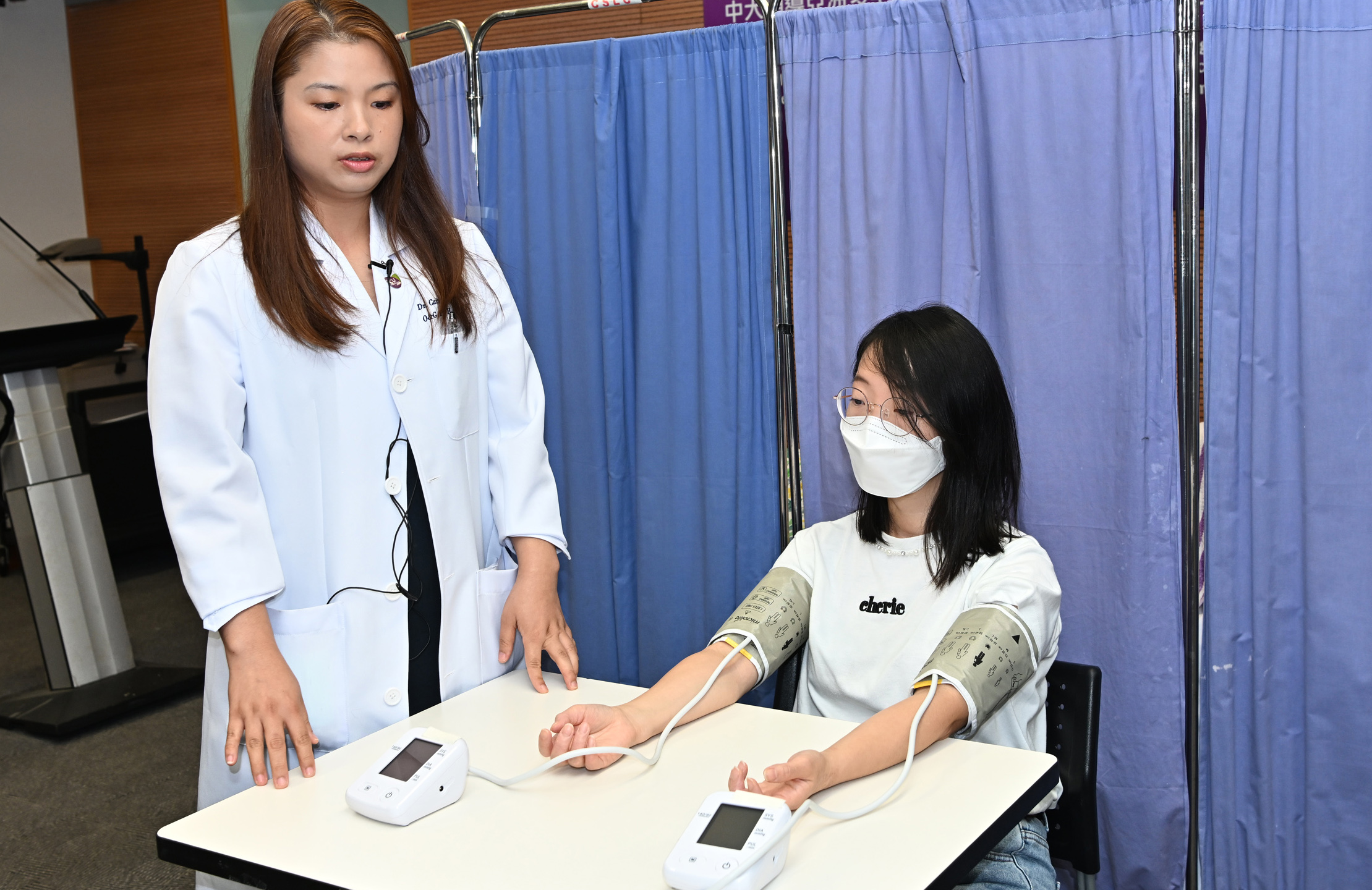
This photo features the procedure of measuring the mean arterial pressure. The measurement has to be done twice on both arms and takes the mean of it.
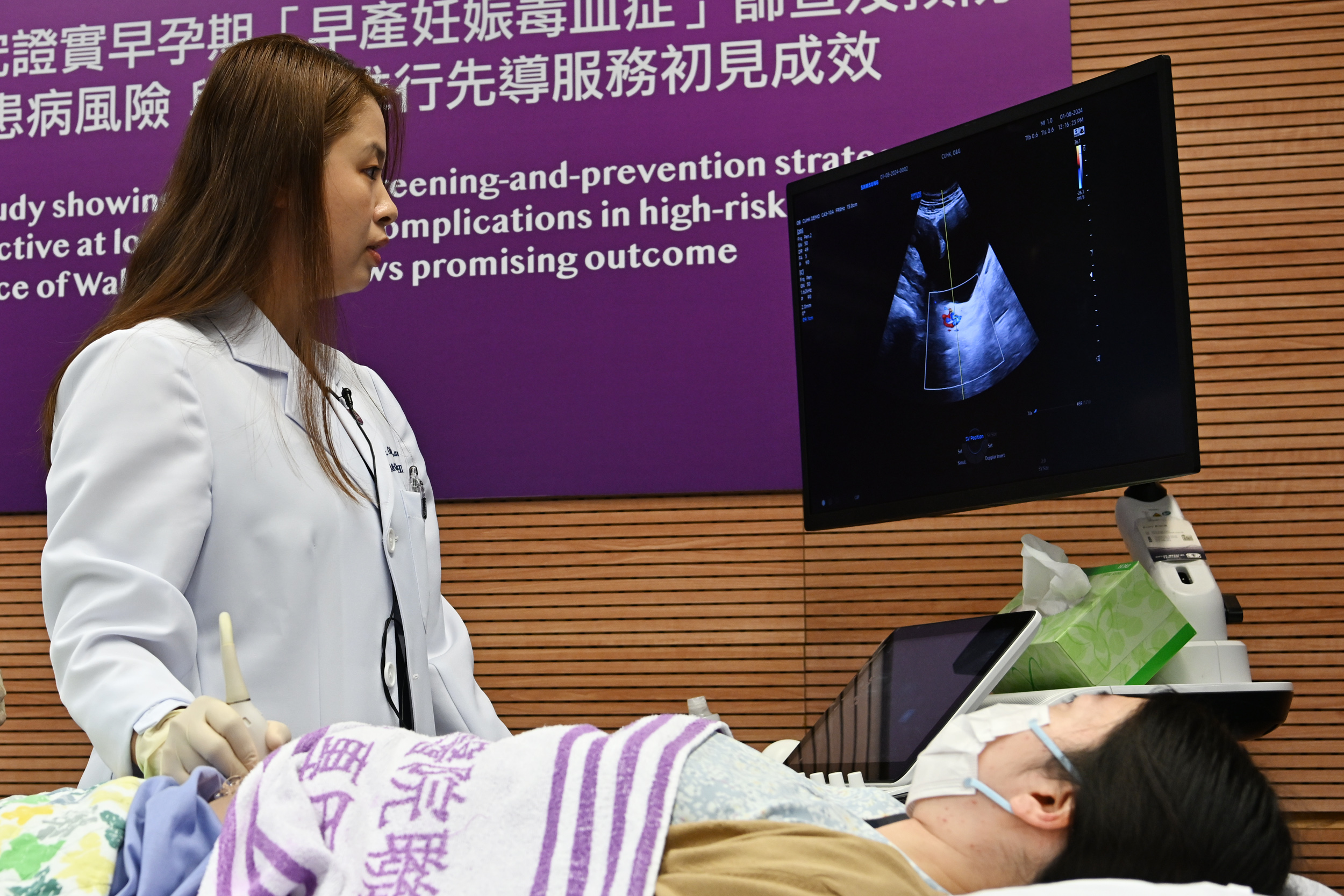
This photo features the measurement of uterine artery Doppler via abdominal ultrasound.



